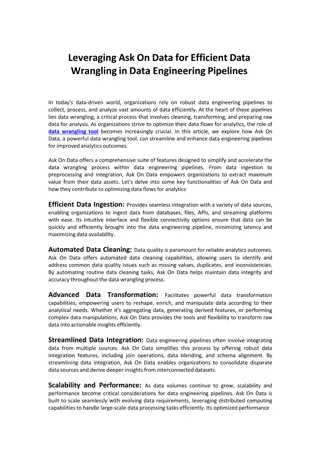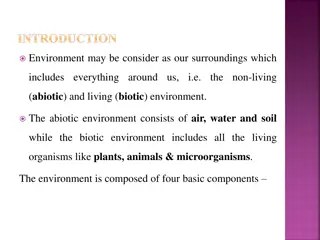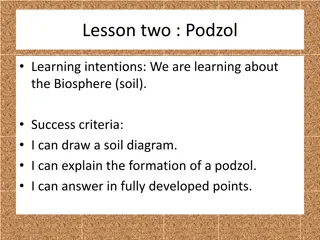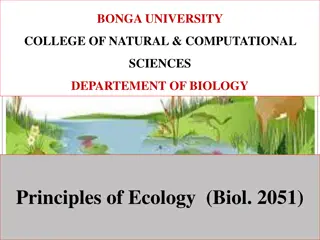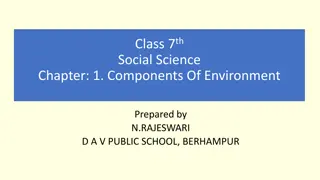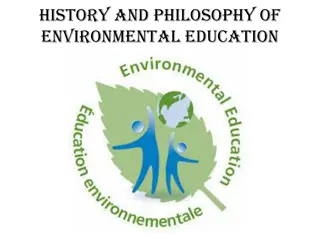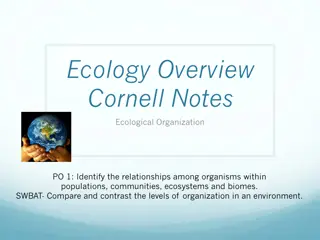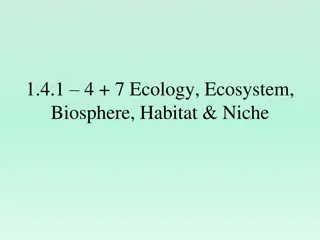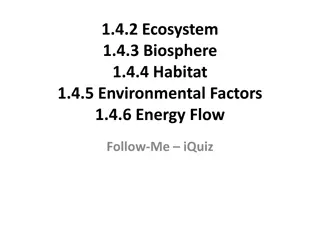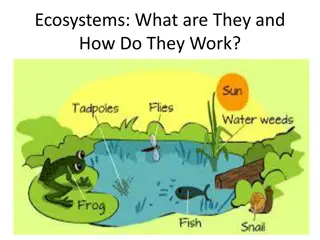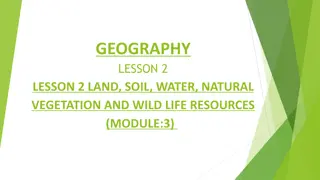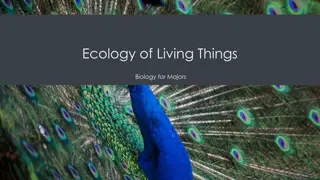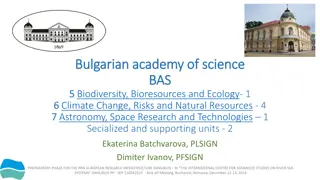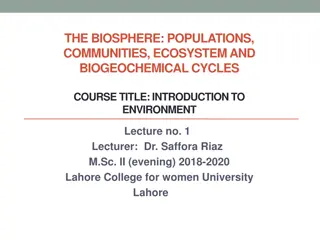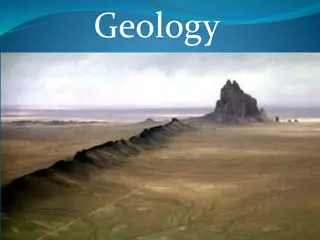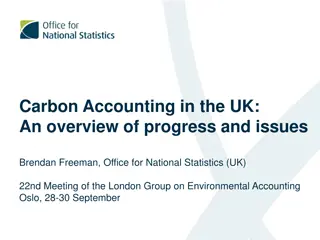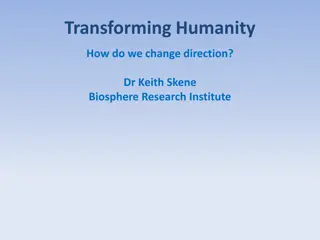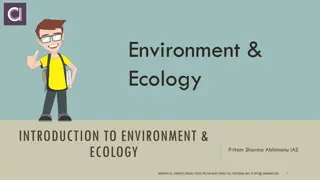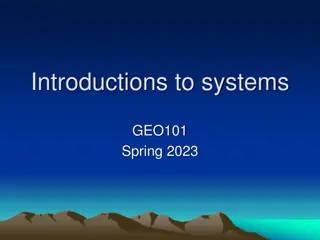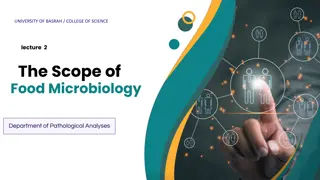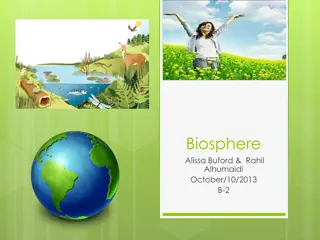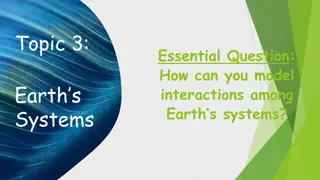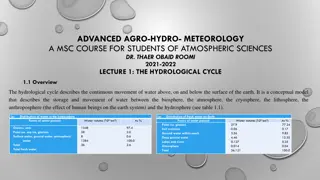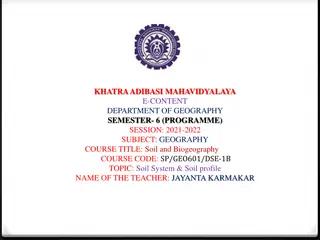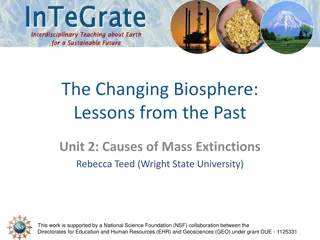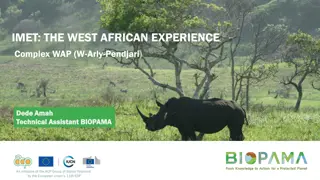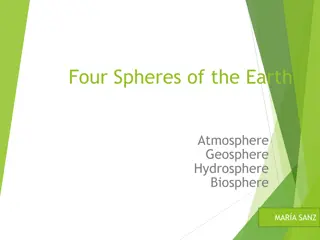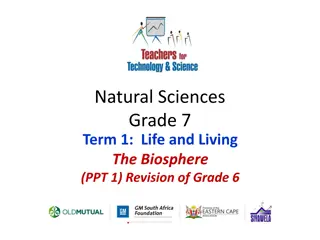Ask On Data for Efficient Data Wrangling in Data Engineering
In today's data-driven world, organizations rely on robust data engineering pipelines to collect, process, and analyze vast amounts of data efficiently. At the heart of these pipelines lies data wrangling, a critical process that involves cleaning, transforming, and preparing raw data for analysis.
2 views • 2 slides
Understanding Earth's Geosphere, Hydrosphere, and Biosphere
Explore the layers of the Earth, its systems, the hydrosphere including the water cycle, and the importance of Earth's oceans through informative content and images presented in this overview.
2 views • 30 slides
Understanding the Components and Types of Environmental Pollution
The environment comprises abiotic and biotic elements, including the atmosphere, hydrosphere, lithosphere, and biosphere. Different types of pollution, such as air, water, land/soil, noise, and thermal pollution, pose significant threats to human health and the environment. Awareness of these pollut
1 views • 17 slides
Understanding Podzol Formation in the Biosphere
Explore the formation of Podzol soil within the biosphere, including its distinctive characteristics and the factors influencing its development such as natural vegetation, climate, relief, soil organisms, drainage, and rock type. Gain insights into the relationship between Podzols and relief in reg
1 views • 17 slides
Optimization of Thermodynamic Balance Control in LEO Biosphere 2
The Landscape Evolution Observatory (LEO) within Biosphere 2 is a groundbreaking research site using advanced sensors to monitor and study water, carbon, and energy cycling in artificial landscapes. A team is working on optimizing thermodynamic control systems to maintain stable temperatures in LEO'
0 views • 12 slides
Understanding Geography: Earth's Description and Study
Geography, coined by Greek scholar Eratosthenes, encompasses the description and explanation of Earth's surface differentiation. It involves physical and human aspects, with branches like geomorphology, climatology, and economic geography. Physical geography studies the lithosphere, atmosphere, hydr
0 views • 6 slides
Principles of Ecology: Understanding Organism-Environment Interactions
Ecology is the scientific study of how living organisms interact with each other and their environment. It involves understanding organisms at their native habitats, from individuals to ecosystems. The discipline encompasses various branches and focuses on the relationships shaping the distribution
1 views • 14 slides
Understanding Components of the Environment in Social Science Chapter 1
The components of the environment play a crucial role in supporting life on Earth. The natural environment consists of physical and biological components that are interdependent. The Earth can be divided into four spheres: hydrosphere, biosphere, atmosphere, and lithosphere. The lithosphere, made of
2 views • 16 slides
Understanding Processes Shaping Earth: Lithosphere, Plate Tectonics, and Effects
Explore the components of our planet, such as the lithosphere, hydrosphere, atmosphere, and biosphere. Learn how the lithosphere, consisting of the Earth's crust and top solid mantle, interacts through plate tectonics, causing movements that shape the Earth's surface. Discover the concept of Pangaea
0 views • 31 slides
Evolution of Environmental Education: From Rousseau to International Recognition
Environmental education has roots dating back to the 18th century with scholars like Rousseau and Agassiz emphasizing nature-centric education. The formalization of environmental education began in 1968 with the UNESCO Biosphere Conference, leading to global awareness and action for environmental co
0 views • 33 slides
Understanding Carbon Movement in the Environment
Explore the intricate processes of carbon movement in the biosphere, atmosphere, oceans, and geosphere. Learn how plants absorb carbon dioxide, animals utilize carbon for tissue building, and the impacts of human activities like burning fossil fuels on carbon distribution. Discover the critical role
0 views • 6 slides
Understanding Ecological Organization in the Environment
Explore the relationships among organisms within populations, communities, ecosystems, and biomes. Delve into the levels of organization in different environments, from populations to the biosphere. Learn about primary and secondary succession, pioneer species, and how environments form. Discover th
1 views • 19 slides
Understanding Ecology and Ecosystems
Discover the definitions and concepts of ecology, ecosystems, biosphere, habitats, and niches. Learn how living organisms interact with each other and their environment, explore different types of ecosystems, and understand the global ecosystem known as the biosphere.
0 views • 20 slides
Understanding Ecosystems and Biosphere
Explore the concepts of ecosystems, biosphere, and habitats in this interactive quiz. Learn about living organisms, environmental factors, energy flow, and more that contribute to the intricate balance of nature.
2 views • 50 slides
Understanding Ecosystems: Components and Interactions
Ecosystems are dynamic systems where abiotic and biotic components interact to sustain life. Ecology studies these interactions, including nutrient cycling and energy flow. The biosphere, comprising the atmosphere, hydrosphere, lithosphere, and living organisms, forms Earth's life-support system. Ec
0 views • 22 slides
Understanding Ecology: Interactions in Ecosystems
Explore the intricate web of interactions in ecosystems through the study of ecology. Learn how biotic and abiotic factors shape ecosystems, trace energy flow, and understand nutrient cycles. Discover the importance of biodiversity and the impact of human activities on the biosphere. Dive into topic
0 views • 51 slides
Understanding Ecology: Interactions in Nature
Ecology entails the study of interactions among organisms and their environment, from the biosphere to ecosystems, populations, communities, and habitats. It includes concepts like competition and limiting factors that impact species survival and population dynamics.
0 views • 30 slides
Understanding Natural Vegetation and Wildlife Resources
Natural vegetation and wildlife play a crucial role in the biosphere, providing essential resources and maintaining ecological balance. The interaction between the lithosphere, hydrosphere, and atmosphere creates the biosphere where living organisms thrive. Plants offer timber, oxygen, and other val
0 views • 16 slides
Understanding Essential Climate Variables (ECV) and Their Requirements
Essential Climate Variables (ECVs) are physical, chemical, or biological variables crucial for characterizing Earth's climate. They provide empirical evidence for climate understanding, prediction, risk assessment, and more. ECVs must be relevant, feasible, and cost-effective, not as stand-alone var
0 views • 14 slides
Understanding Ecology: Interactions and Environments in Biology
Ecology is the study of interactions between living organisms and their environment. It involves levels of research such as animal ecology, plant ecology, and more, while also exploring the biosphere's impact, biogeography, species distribution patterns, and energy sources like sunlight. Ocean upwel
1 views • 80 slides
Terra Architecture and Design Overview
Terra is a platform driven by the Data Biosphere vision to enable an ecosystem of interoperable components across organizations. It utilizes GA4GH standards and serves various roles such as Biomedical Researchers, Custom Apps & Portals, and Data Developers. The architecture is being restructured to
0 views • 8 slides
Bulgarian Academy of Science - Research Institutes and Initiatives
The Bulgarian Academy of Science (BAS) is a prestigious research institution comprising diverse units focusing on biodiversity, ecology, climate change, astronomy, and space research. Notable initiatives include the International Centre for Advanced Studies on River-Sea Systems (DANUBIUS) and variou
0 views • 6 slides
Understanding the Earth's Environmental Systems and Cycles
Explore the interconnected systems of the Earth's biosphere, lithosphere, hydrosphere, and atmosphere, along with biogeochemical cycles like the hydrological cycle. Learn how these systems interact to sustain life and maintain Earth's dynamic environment over billions of years.
1 views • 28 slides
Exploring the Fascinating World of Geology and Earth Sciences
Delve into the diverse field of geology, covering topics such as physical and historical geology, geochronology, mineralogy, petrology, and more. Learn about the solar nebula hypothesis and the Earth's lithosphere, hydrosphere, atmosphere, and biosphere. Discover the composition of Earth's atmospher
0 views • 12 slides
Overview of Carbon Accounting in the UK: Progress and Challenges
The project aims to test the feasibility of producing SEE-EEA style Carbon Accounts, assess data sources, and lay a path for further development. Carbon accounting in SEE-EEA identifies carbon as a key theme, supporting ecosystem measurement. The UK's carbon accounts cover geosphere, biosphere, ocea
0 views • 15 slides
Promoting Sustainable Development and Public Participation in Managing the Amazon Forest Area in Leticia, Colombia
Education for Sustainable Development in Protected Areas and Biosphere Reserves explores public participation and stakeholder involvement in the management of the Amazon Forest Area in Leticia, Colombia. The study emphasizes sustainable tourism, ecotourism, and the development of local products. Rec
0 views • 6 slides
Exploring Transformation and Change for a Sustainable Future
Delve into the discussions led by Dr. Keith Skene at the Biosphere Research Institute on transforming humanity and changing course towards a more sustainable direction. Engage in projects, delve into transition theory, measure change, and explore overcoming barriers to transition. Reflect on the nec
0 views • 50 slides
Understanding Earthquakes and Seismic Waves
This lecture delves into the nature and origin of earthquakes, discussing seismic waves, measurement techniques, effects of earthquakes on various Earth systems, and the relationship between earthquakes and plate tectonics. The content touches on topics like the impact of earthquakes on biosphere, h
0 views • 34 slides
Introduction to Ecology and Environment Studies
Ecology is the study of the relationship between organisms and their environment, while the environment refers to the surroundings that influence living organisms. The biosphere is divided into the atmosphere, lithosphere, and hydrosphere. Terms in ecology include species, populations, communities,
0 views • 13 slides
Introduction to Earth Systems in GEO101 Spring 2023
Explore the fundamental concepts of Earth systems in GEO101 Spring 2023, covering the components, linkages, states, and examples of systems such as Atmosphere, Lithosphere, Hydrosphere, and Biosphere. Gain insight into the interconnections and dynamics of these systems to understand the complexity o
0 views • 30 slides
Exploring the Fascinating World of Food Microbiology and Microbial Habitats
Delve into the intriguing realm of food microbiology, uncovering how fermentation microbes can positively influence food properties, the importance of microbiological quality assurance, and the diverse habitats where microorganisms thrive. Learn about the impact of microflora on food quality and saf
0 views • 7 slides
Understanding the Biosphere: Life on Earth
The biosphere encompasses all life on Earth, from individual organisms to ecosystems, biomes, and interactions between living and non-living components. Learn about the importance, components, and energy flow in the biosphere, highlighting its role in sustaining life on our planet.
0 views • 7 slides
Understanding Interactions Among Earth's Systems
Explore the interconnectedness of Earth's systems including the geosphere, biosphere, hydrosphere, and atmosphere. Learn how these systems interact and affect each other, from the rocks and soil of the geosphere to the living organisms in the biosphere, and the impacts of events like acid rain on th
0 views • 15 slides
Understanding the Hydrological Cycle in Advanced Agro-Hydro-Meteorology
The hydrological cycle involves the continuous movement of water on, above, and below the Earth's surface, encompassing various realms such as the biosphere, atmosphere, cryosphere, lithosphere, and hydrosphere. This cycle describes the storage and movement of water within different Earth systems an
0 views • 14 slides
Understanding the Importance of Soil Systems
Soils play a vital role in the Earth's ecosystems by forming at the interface of various elements like the atmosphere, lithosphere, biosphere, and hydrosphere. They consist of weathered bedrock, organic matter, air, and water, making them essential for sustaining life. Soil interactions with differe
0 views • 36 slides
Causes of Mass Extinctions in The Changing Biosphere
Explore the causes of mass extinctions through flood-basalt eruptions and meteor impacts in "The Changing Biosphere: Lessons from the Past" unit. Learn about the effects, evidence, and comparisons of ancient mass extinctions, supported by a National Science Foundation collaboration.
0 views • 12 slides
Impact of Climate Change and Pollution on the Biosphere
The chapter discusses the significant threats posed by climate change and pollution to the biosphere, including the water cycle, atmospheric changes, and the effects of human activities on aquatic and air pollution. It addresses issues like acid rain, ozone depletion, and global warming. The content
0 views • 20 slides
Enhancing Protected Area Management with IMET in West Africa
Experience the Integrated Management Effectiveness Tool (IMET) in the West African region, specifically the Complex WAP (W-Arly-Pendjari) area, a Transboundary Biosphere Reserve comprising five national parks. Explore how IMET assessment by BIOPAMA trained coaches and park managers leads to data col
0 views • 9 slides
Understanding the Four Spheres of the Earth: Atmosphere, Geosphere, Hydrosphere, Biosphere
Explore the Earth's Atmosphere, Geosphere, Hydrosphere, and Biosphere in detail, learning about their composition, significance, and interactions. Discover how these spheres are interconnected and function as systems within the planet, supporting life and natural processes.
0 views • 20 slides
Exploring the Earth's Biosphere: Grade 7 Science Revision
Delve into the fascinating world of the Earth's biosphere through this Grade 7 Science revision presentation. Topics covered include the Earth's position in the solar system, its unique features such as water coverage and rotation, as well as essential concepts like day and night, Earth's revolution
0 views • 9 slides
